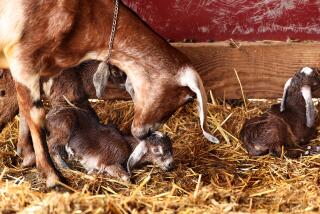Taking the Bull by the Horns : Farmer Feeds Cattle With Bakery Goods
- Share via
WHITESTOWN, Ind. — Visitors to William Walker’s cattle farm walk away with an unlikely substance stuck to the bottom of their shoes: powdered sugar.
Walker began feeding bakery goods to the approximately 3,000 cattle on his Boone County farm about five years ago. His reasons were purely economic.
“The cattle business was getting so bad that we figured we had to do something,” Walker said.
Feeding his cattle discarded bakery goods has achieved its intended result; Walker says his feed bills are now about one-third of what they were when he was using corn.
Meat Tastes Better
But there has been an unexpected bonus. Walker said his livestock’s meat tastes better.
“I think it’s a better quality. The meat’s whiter, and I think it tastes sweeter,” Walker said. At least one of his customers agrees.
“There’s a difference in his quality of meat,” James Jones, owner of Jones Meat Shop in the adjacent village of Zionsville, said of the meat from Walker’s livestock. “It definitely has a better flavor and it cuts better . . . My customers like it better.”
Though Walker’s cattle aren’t getting top-of-the-line pastries, they haven’t complained. They don’t seem to mind that the chocolate isn’t spread just right or that their hamburger buns have been baked too long.
There’s no whining about the imperfect chocolate-covered doughnuts, crumbling crumb cakes or shredded taco shells in their feed bags.
A total of 100 tons of breads and cakes are transported to Walker’s farm each week from four Indianapolis bakeries.
A 10-foot-high, aromatic pile of sugar- and chocolate-coated cakes, some still in their name-brand wrappers, sits in the middle of a building at the rear of the farm, surrounded by smaller piles of mostly hamburger buns.
Hauling Baked Goods
Before Walker began paying to ship the substandard cakes and breads to his farm, the bakeries were paying to have them hauled off.
“In cattle feeding, one man’s garbage is another man’s banquet,” said T. Wayne Perry, an animal nutritionist at Purdue University. “The main thing is that this is a cheap way to feed cattle, and the meat processors and the big grocery stores find it makes beef more competitive.”
Just like humans, though, cattle need a balanced diet. Walker gives them vitamins and minerals as well as corn and roughage.
Too many sweets, though, can mean an upset stomach--even for a cow.
“If you or me were to eat a lot of this stuff, we’d get a stomachache and go get Rolaids,” Walker said. “Well, we give the cattle magnesium oxide to keep the gas down.”
But unlike humans, Walker said his cattle have not gained more weight on this diet than when they were being fed corn.
Walker, who is under contract with the bakeries to haul the goods from their premises, said his idea has caught on with several other farmers in central Indiana.
He now sells the bakery wastes to six other farmers.
Walker’s two farm dogs also seem to think the sugar-coated barn floors are a great deal.
“We don’t buy dog food anymore,” Walker laughs. “They love it.”
More to Read
Sign up for The Wild
We’ll help you find the best places to hike, bike and run, as well as the perfect silent spots for meditation and yoga.
You may occasionally receive promotional content from the Los Angeles Times.






